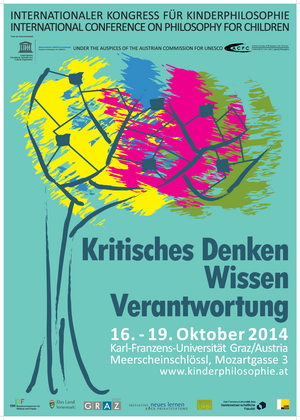International Conference of Philosophy for Children 2014
"Critical thinking - Knowledge - Responsibility"
from 16 - 19 October 2014 in Graz/AustriaOur society is undergoing fundamental change due to increasing globalisation, scientific and technological progress and digital information transfer. What is changing is not only the knowledge about the foundations of our social, media, cultural and economic coexistence, but also the access to and handling of this knowledge. Consequently, a profound structural change is emerging that raises urgent socio-political and educational policy questions, particularly with regard to the development of young people. What influence do these changes have on the development of thinking and personality as well as on the fundamental ability of children and young people to perceive and resolve conflicts? Obviously, it cannot be assumed that these changes will go hand in hand with participation and equal opportunities for all young people in the population.

With reference to the current cultural, socio-political and educational policy debates, the International Congress on Philosophy for Children 2014 will address the resulting challenge of critically discussing the existing and possible new relationships between knowledge and responsibility. However, critical thinking as a decisive mediating and justifying instance should not merely be used as a means to the end of discourses, but rather be more strongly integrated into the philosophical-pedagogical potential for concrete areas of education. What does the ability to think critically actually mean? What is knowledge? What is the connection between knowledge and responsibility?
Critical thinking is based on rapidly expanding criteria in order to achieve pronounced standards of judgement and self-reflection. The congress aims to redefine these prerequisites and abilities of critical thinking in accordance with the social, medial, cultural and economic demands that young people are inevitably confronted with today in their living, learning and working environments. The aim is to find new meanings in order to provide a basis for improving young people's orientational knowledge.
Never before in human history have knowledge and responsibility been so intertwined. This means that both individual and collective responsibility are on the rise. This is especially true for educational thinking and in particular for strategic thinking, generally network-like connections between the increase in knowledge on the one hand and non-knowledge on the other. Responsibility must be positioned between these categories in a philosophical and pedagogical way.
Knowledge that is difficult or even impossible to access quickly leads to disorientation, disinterest and ultimately to a problem of responsibility for society as a whole, which can only be addressed by philosophical, scientific and political actors through appropriate interdisciplinary and transdisciplinary co-operation. The congress is intended to contribute to the development of conceptual foundations for concrete analyses and strategies which, in the field of tension between critical thinking, knowledge and responsibility, will enable "us to choose the best form of political and social organisation, to recognise our own values, in short, to become in a comprehensive way what each of us is, namely a free human being." (Federico Mayor, former UNESCO Director-General)
As the great interest shown by the approximately 200 congress participants from around 20 countries, including renowned international experts from various disciplines and fields, shows, our work has become exemplary beyond national borders. We are expecting another eventful congress this year. International projects have intensified our collaboration with numerous domestic and foreign universities and other educational institutions, including those outside Europe.
The topics of the congress include the following areas:
- Critical thinking
- Teaching argumentation and reasoning
- Tensions between knowledge and responsibility
- Individual and collective responsibility
- New dimensions of knowledge
- Relevance of philosophical questions
- Inter- and transdisciplinarity
- Lifelong learning: philosophical perspectives and education
- Philosophising with children and education in the digital age